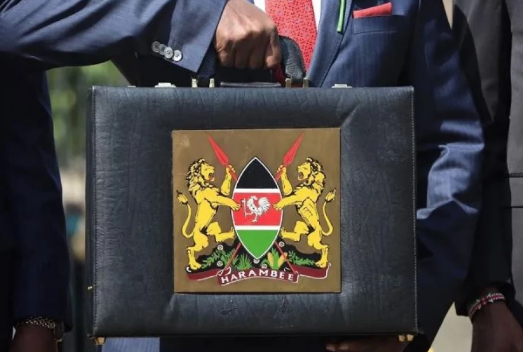Kenyans are missing out on development due to low budget absorption at both national and county government levels, according to official data. This issue is compounded by poor Public Finance Management and the fact that the country loses about a third of its annual budget to corruption, despite increasing spending plans each year.
Recurrent expenditure, which includes salaries, operations, and maintenance, takes up the largest portion of the budgets.
Over the past five years, the country’s budgets have been as follows:
– 2020-21: Sh2.89 trillion (recurrent Sh1.82 trillion)
– 2021-22: Sh3.03 trillion (recurrent Sh2 trillion)
– 2022-23: Sh3.3 trillion (recurrent Sh2.2 trillion)
– 2023-24: Sh3.7 trillion (recurrent Sh2.53 trillion)
– 2024-25 projected: Sh3.99 trillion (recurrent Sh2.84 trillion)
However, the government’s push for more revenues through the Finance Bill 2024 faced protests, forcing the Treasury to reconsider after President William Ruto directed budget cuts.
Development expenditures, including foreign-financed projects, allocation to the Contingencies Fund, and conditional transfers to county governments, have averaged between Sh633 billion and Sh707 billion over the past five years.
Equitable share allocation to the counties was Sh370 billion in 2022-23, Sh385 billion in 2023-24, while the 2024-25 budget had proposed an allocation of Sh444.5 billion.
The latest data from the Office of the Controller of Budget (Budget Implementation Review Report) for the first six months of the 2023-24 financial year shows the absorption rate of development funds by Ministries, Departments, and Agencies at 25.2 per cent.
Ministerial allocations for the financial year ended yesterday were initially Sh2.37 trillion, revised to Sh2.64 trillion through the Supplementary Budget, comprising Sh783.22 billion for development activities and Sh1.68 trillion for recurrent programmes.
“In the first six months, the ministerial expenditure was Sh950,33 billion (absorption rate of 36.6 per cent), consisting of Sh197.41 billion for development activities, representing 25.2 per cent, and Sh752.92 billion for recurrent activities, representing 44.8 per cent,” Controller of Budget Margaret Nyakang’o says in the report.
The low absorption of development budget is said to be denying taxpayers key government services and development, including infrastructure, with billions of unspent monies being returned to the exchequer annually.
Gaps
This has been blamed on lengthy procurement procedures, stringent donor conditionality and weak reporting.
“Both levels of government are more disciplined at the allocation stage compared to actual budget implementation,” the International Budget Partnership Kenya (IBP Kenya), now Bajeti Hub, indicates.
While budget conditions under the Public Finance Management (PFM) Act and its regulations apply across national and county levels in Kenya, significant gaps have led to continued poor utilization of funds and low development spending.
This issue persists even as employees draw billions in salaries and allowances, including inflated salaries for top government officials. Counties are spending up to 70 percent of their budgets on salaries, contrary to the requirement to spend no more than 35 percent, according to the Controller of Budget.
Last year, the Controller of Budget also flagged approximately Sh5.7 billion in salary payments made outside approved payroll systems in the nine months leading up to March 2023. Additionally, Auditor General Nancy Gathungu reported that government ministries, departments, and agencies spent Sh147.39 billion without parliamentary approval in the 2022-23 financial year.
Most of the spending has gone towards recurrent expenditure, with development funds failing to be utilized for planned projects at both national and county levels. In March this year, the Controller of Budget noted that although counties withdrew more than 60 percent of authorized funds, many still struggled with fund absorption.
Machakos County was ranked lowest in fund absorption despite having available funds, with Makueni, Kisumu, Homa Bay, Kwale, and Kakamega also performing poorly, thereby denying their populations much-needed development projects.
It is estimated that a third of the country’s budget is lost to corruption, according to the Ethics and Anti-Corruption Commission (EACC). Former President Uhuru Kenyatta indicated that approximately Sh2 billion is lost daily to corruption.
Based on EACC estimates, this translates to at least Sh1.3 trillion lost in the current financial year, pegged on the Sh3.9 trillion budget presented by Treasury CS Njuguna Ndung’u last month.
This financial mismanagement persists despite continued borrowing to bridge the budget deficit, which has left the country deep in debt. Kenya’s debt stood at Sh10.4 trillion as of March, forcing the government to seek Public-Private Partnerships (PPPs) to implement key development projects.


